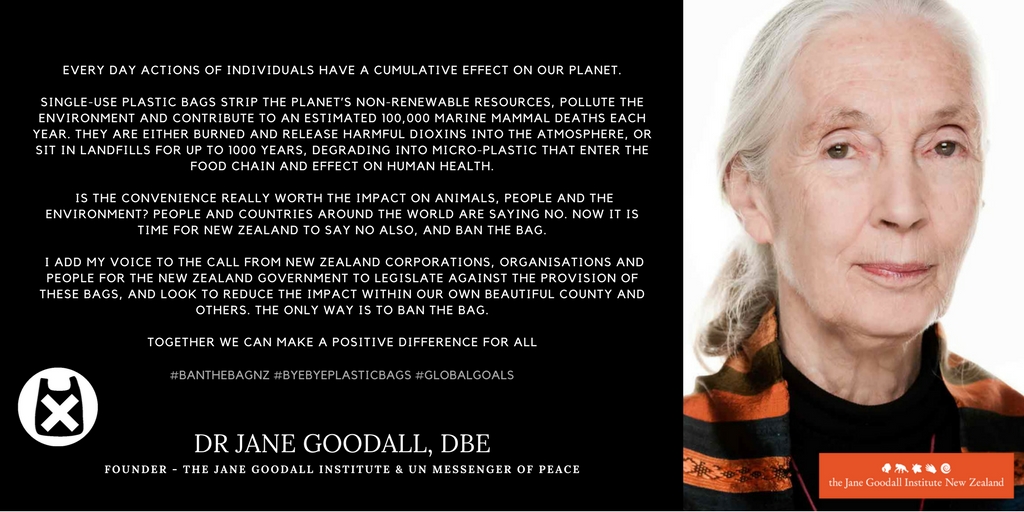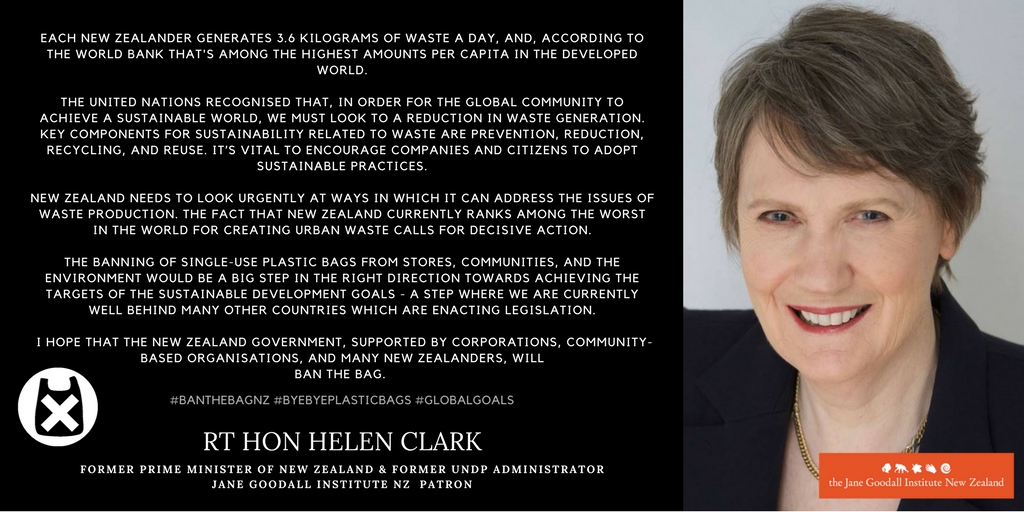Bye Bye Plastic Bags


- On average, we use a plastic bag for 12 minutes but it lasts in our environment for 500-1000 years.
- 8 million tons of plastic is dumped into our oceans every year.
- By 2050, the ocean will contain more plastic than fish by weight.
- 25% of the fish found in markets and consumed by US have plastic inside them.


**BAN THE BAG**
In partnership with Greenpeace NZ, and with the co-support of Dr Goodall, the Right Honourable Helen Clark, local councils, corporations, non-governmental and community organisations and individual New Zealanders, JGINZ is asking the New Zealand government to make regulatory change to ban single-use plastic bags.
Your Hope In Action
On the 27th of February, we joined our co-supporters and presented a letter of request and 65,000 strong petition to call for a ban of single-use plastic bags in New Zealand.
You can: View the letter we presented to the New Zealand Government.
As this now goes to select committee you can still Sign the petition. Spread the message on social media and most importantly make your own positive difference about the impact you have each day.
#BanTheBagNZ #ByeByePlasticBags
Plastic bags are produced from non-renewable resources, are essentially indestructible, and yet they're used and thrown away with reckless abandon. Most end up in the ocean, where they pollute the water and harm marine life; the rest are burned, where they release harmful dioxins into the atmosphere or sit in landfills where it can take up to 1000 years to degrade.
Plastic bags in the marine environment contribute to an estimated 100,000 marine mammal deaths per year. They create a risk of entanglement and turtles and whales have been found to eat them. Plastic bags are also problematic for humans as, over time in the marine environment, they degrade into micro-plastic which attract persistent organic pollutants and enter the food-chain once they have been consumed by fish.
New Zealanders use around 1.6 billion single-use plastic bags every year. These plastic bags are used on average for less than 12 minutes - Is the convenience really worth the impact on environmental resources and life of a marine creature?

Bye Bye Plastic Bags is a social initiative driven by youth to get the people to say no to plastic bags. Founders and sisters, Melati (16) and Isabel (14) Wijsen started Bye Bye Plastic Bags 4 years ago when inspired thought “What can we do as children living in Bali, what can we do NOW.” Bye Bye Plastic Bags was born in 2013 has become a well known international movement of inspiration, youth empowerment, and of course, saying no to plastic bags.
"Don't ever let anyone tell you that you're too young or you won't understand," Isabel says to other aspiring activists. "We're not telling you it's going to be easy. We're telling you it's going to be worth it."
Bye Bye Plastic Bags New Zealand

JGI NZ is thrilled to partner with the amazing founding BBPB crew and now be the base for the Bye Bye Plastic Bag New Zealand campaign.
In Auckland alone, about 17,000 tonnes of household soft plastics ended up in landfill in 2016. That compares with about 360 tonnes collected nationally each year under the supermarket-based Soft Plastic Packaging Recycling Scheme.
It would seem rather than recycle we should say bye bye to plastic bags.
We are driving this campaign through raising public awareness and inspiring individuals to change behaviour and pursuing regulatory change from the New Zealand Government to ban the provision of single-use plastic bags in our country.

Take Action
In your own life - Look to alternatives to single-use plastic bags. Ideally, to lessen the associated impact of the production and waste, these would be carry bags that can be used for around 150 uses.
In our country - Governments all over the world have taken action to ban the sale of lightweight single-use plastic bags. The Bangladesh government was the first to do so in 2002, imposing a total ban on the bag. Such a ban has also been applied in countries such as Rwanda, Senegal, Kenya, Bangladesh, China, Myanmar, countries in Western Europe and North America. Many States in Australia have legislation banning single-use plastic bags and recently two Australian supermarkets, Woolworths - a parent company of Countdown - and Coles, announced that they will stop giving single-use plastic bags to shoppers within the next year.
New Zealand has fallen behind in efforts to eradicate these impactful single-use plastic bags. Fortunately in the last year the two major supermarket chains in New Zealand have agreed to ban out plastic bags in 2018. - We thank our supporters for sharing there voice in 2017 we undertook a petition to ask New World to look to ban plastic bags. The public spoke and this retailer listened!
Now we are reaching higher - And you can help.
We are asking the government of New Zealand to 'Ban The Bag' - and you can help - In partnership and with a wonderful gathering of co-supporters - retailers, organisations, experts - and we are asking the New Zealand Government to ban single-use plastic bags in New Zealand - You can sign a petition and add your voice, and even attend the event when we present our letter and petition to the Ministers.
Surely it is time for New Zealand to join the large number of countries that have already banned these bags.
Lets say Bye Bye Plastic Bags!

Join Bye Bye Plastic Bags New Zealand
Are you interested in getting involved with the Bye Bye Plastic Bags campaign, joining a group or starting your own - Let us know!


